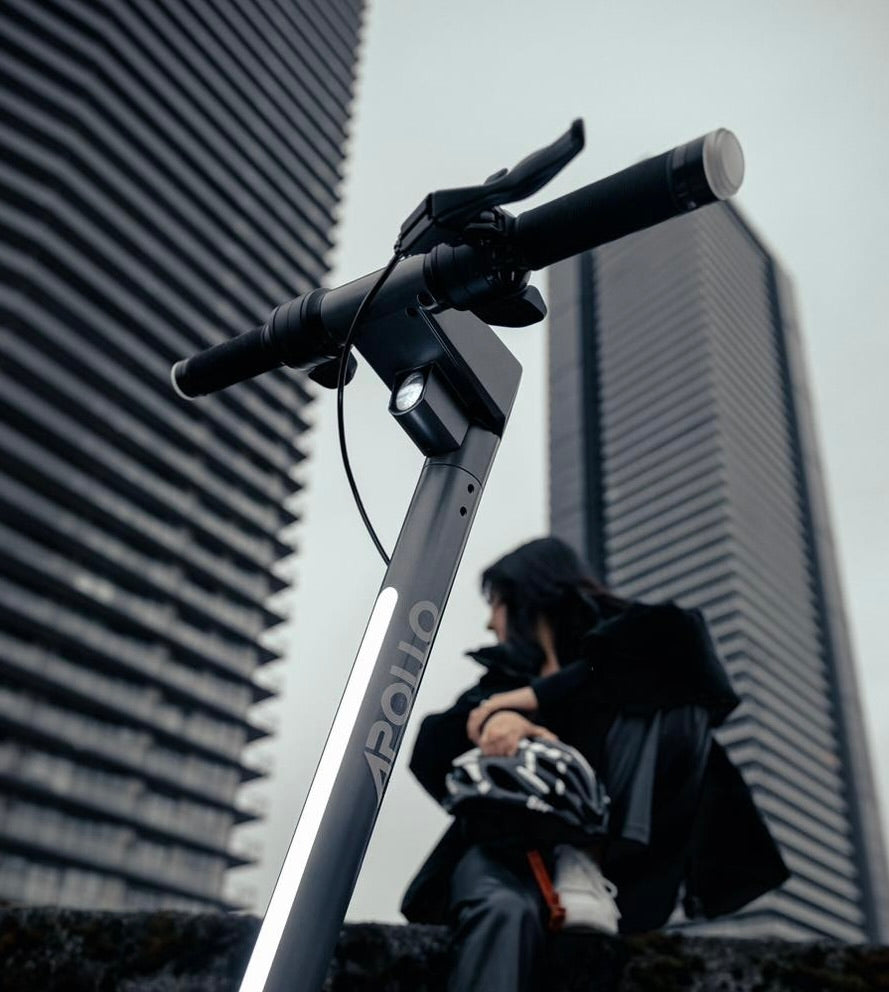Before the advent of electric scooters, commuters faced a stark choice: the hefty expenses of car ownership or the discomfort of public transportation. Bicycles were a luxury for those lucky enough to live within pedaling distance of their destinations. For everyone else, daily travel was a source of stress and financial strain. Then, everything changed.
Electric scooters have revolutionized the way we think about commuting. Are cars becoming relics of the past, or can they coexist in synergy with this ground-breaking mode of transport? Join us as we try to answer those questions below.
The advantages of Electric Scooters Over Cars
#1. Cost-Saving Benefits
One of the most appealing characteristics of electric scooters is their affordability. Why is this so appealing? We all know the pain of visiting the gas station to refuel our cars and then justifying this expense as paying for a sense of freedom that only cars used to offer. But now, things are different.
Electric scooters can travel up to 100 km in every direction at a fraction of the cost of driving a car. An average electric scooter costs around 4 cents per charge. Here is a detailed breakdown of electric scooter charging costs. Whereas, the annual fuel cost for an average car owner in the U.S., assuming 15,000 miles driven per year, is around $1,840. Based on the average gas price and typical fuel efficiency, this translates to approximately $153.33 per month.
But the savings don't stop there. Owning a car comes with many hidden costs, such as parking fees, which can be pretty steep in larger cities. Additionally, finding a suitable parking spot can be a challenge, turning a simple task into an ordeal.
Another critical point to consider is the initial cost of buying a car. According to CarEdge, on average, the price of a new car in the U.S. as of March 2024 is approximately $47,218. Non-luxury vehicles average around $44,052, while luxury vehicles can cost about $62,067 on average. In terms of used cars, the average cost varies depending on factors like age, mileage, and condition. As of early 2024, the average price of a used car hovers around $26,510.
As you can see, electric scooters are much cheaper than cars in many aspects, making your commute and your day much better. And this is merely the beginning of our list.
What about electric cars?
While switching to an electric car eliminates the need for gasoline, it's important to understand the costs associated with charging.
According to Car and Driver, charging a Tesla Model Y at home for 100 miles costs approximately $3.82 based on the average U.S. electricity rates. However, if you rely on Tesla's Supercharger network, the cost for the same 100 miles can range from $10 to $19.
Public charging stations, in general, tend to be more expensive than home charging, with prices varying depending on the provider, location, and charging speed. For example, EnelWay reports that Level 2 public chargers typically cost between $0.20 and $0.25 per kWh, while faster Level 3 chargers can range from $0.40 to $0.60 per kWh.
#2. Lower Maintenance Requirements
One of the most appealing aspects of electric scooters is their surprisingly low maintenance needs. Unlike cars, which demand frequent oil changes, filter replacements, and complex repairs, e-scooters are refreshingly simple to keep in good condition. With just a few basic checks and occasional cleaning, your electric scooter will stay zippy and reliable for countless rides.
Minimal Maintenance Needed
So, what exactly does electric scooter maintenance involve? It's mostly a breeze:
Battery Care: Keep an eye on your battery level and charge it regularly.
Tire Check: Ensure your tires are properly inflated and free of wear and tear.
Brake Inspection: Regularly test your brakes to ensure they're functioning smoothly.
General Cleaning: Wipe down your scooter to remove dirt and grime after each use.
That's it! No messy oil changes, complicated engine tune-ups, just a few tasks to keep your electric scooter humming.
For more detailed tips on how to take care of your electric scooter, watch the video below:
https://www.youtube.com/watch?v=_IVg82eYZiE
Cost of Maintenance
When it comes to maintenance costs, electric scooters are the clear winners. Compared to the hefty expenses associated with car maintenance, electric scooter upkeep is practically pocket change. Think of it this way: the money you save on maintenance can be put towards fun accessories, exciting adventures, or even a delicious treat for yourself!
Let's be real: who wouldn't prefer a hassle-free, budget-friendly mode of transportation? Electric scooters offer all that and more, making them an excellent choice for those who value convenience and affordability.
#3. Healthy in body and mind

Electric scooters aren't just a convenient mode of transportation; they're also a sneaky way to smuggle some exercise into your daily routine! While it may not feel like a strenuous workout, riding an electric scooter engages various muscle groups, contributing to a healthier body.
Core Engagement: Balancing and maneuvering the scooter activates your core muscles, promoting better posture and stability.
Leg Workout: Pushing off to start and maintaining balance works your leg muscles, including your calves, quads, and hamstrings.
Cardiovascular Benefits: Riding at a moderate pace can elevate your heart rate, improving cardiovascular health.
Balance and Coordination: Riding an electric scooter, especially on bumpy roads, requires constant posture correction, which enhances balance and coordination skills.
Mind
Put an end to traffic frustration! With an electric scooter, you can zip through congested streets and arrive at your destination feeling refreshed and relaxed.
No Stress: Avoid traffic congestion and arrive at your destination with a clear mind, ready for the challenges ahead.
Enjoyable Commute: Commuting is not all fun and games. Wrong. It can be exactly that.
Mindfulness: Focus on the present moment as you navigate the streets, promoting mindfulness.
Outdoor benefits: Unlike being cooped up in a car, riding an electric scooter allows you to soak up the sunshine and breathe in the fresh air, which translates into a better mood and well-being.
May Help Reduce Anxiety: Spending time outdoors and engaging in physical activity has been shown to reduce anxiety levels
You can expect many more whopping benefits from riding an electric scooter.
#4. No car, no problem
One of the most satisfying advantages of owning an electric scooter is its ability to avoid traffic jams.

While it might seem like a small amount of time saved, consider that U.S. drivers spent an average of 51 hours in traffic last year—15 hours more than in 2021. Meanwhile, in Chicago alone, drivers spent a staggering 155 hours stuck in traffic. This congestion not only wasted time but also led to an increase of $134 in gas costs.
The ranking of most congested cities in the USA:
- Chicago — 155 h
- Boston — 134 h
- New York City — 117 h
- Philadelphia — 114 h
- Miami — 105 h
- Los Angeles — 95 h
- San Francisco — 97 h
- Washington, D.C. — 83 h
- Houston — 74 h
- Atlanta — 74 h
Why waste hours of your life stuck in traffic when you could enjoy the scenery, get some fresh air, or simply arrive at your destination on schedule. With an electric scooter, you can reclaim that time and make the most of every day.
#5. Environmental Benefits

Electric scooters are a breath of fresh air for our planet. Unlike their gas-guzzling counterparts, e-scooters produce zero greenhouse gas emissions, making them a champion for cleaner air and healthier cities. Choosing an e-scooter over a car significantly reduces your carbon footprint and contributes to the fight against climate change. The eco-friendly benefits don't stop there:
- Cleaner Air: E-scooters eliminate harmful tailpipe emissions contributing to air pollution, smog, and respiratory problems.
- Reduced Noise Pollution: An electric motor's quiet hum replaces the engine's roar, creating a more peaceful urban environment.
- Less Congestion: E-scooters take up less space on the road and in parking areas, helping to alleviate traffic congestion and improve urban mobility.
- Sustainable Resource Use: E-scooters require fewer resources to produce and operate than traditional vehicles, contributing to a more sustainable future.
- Energy Efficiency: E-scooters are incredibly energy-efficient, requiring significantly less energy per mile than cars, reducing energy consumption.
By opting for electric scooters, we're not just choosing a convenient mode of transportation; we're actively creating a cleaner, greener, and more sustainable world for ourselves and future generations.
#6. Regulatory and Convenience Factors
Unlike cars and motorcycles, e-scooters generally don't require you to go through the rigmaroles of getting a license, registration, or insurance. This makes them incredibly convenient for those seeking a hassle-free mode of transportation.
No Need for License, Registration, or Insurance
No Bureaucratic Hassle: Say goodbye to the paperwork and red tape associated with obtaining a driver's license or registering a vehicle.
Cost Savings: Avoid the recurring costs of insurance premiums and vehicle registration fees.
Easy Access: Simply purchase your electric scooter and start riding, without having to worry about complex legal requirements.
Please Note: It's important to verify the specific regulations regarding e-scooter use in your local area, as rules may vary.
Convenience at Your Fingertips
The regulatory simplicity of e-scooters, combined with their portability and ease of use, makes them a convenient and accessible transportation option for many people. Whether you're using it for your daily commute, running errands, or simply enjoying a leisurely ride, the lack of bureaucratic hurdles makes electric scooter ownership a breeze.
Drawbacks of E-scooters
So far, we have extensively extolled electric scooters, and now the time has come for some home truths. Undoubtedly, e-scooters boast many useful benefits, but they also have some downsides.
Limited Range and Speed Compared to Cars
Battery Life: E-scooter batteries typically offer a limited range per charge, usually ranging from 15 to 40 miles, depending on the model and usage. This can be a constraint for longer commutes or trips.
Speed Limitations: E-scooters generally have lower top speeds compared to cars, usually ranging from 15 to 50 mph. This may not be suitable for those seeking high-speed transportation.
Weather Dependency
Unsuitable in Bad Weather: Riding an e-scooter in rain, snow, or icy conditions can be dangerous and uncomfortable. The reduced traction and visibility pose safety risks, and the scooter's components may be susceptible to damage from moisture. It’s doable, but not recommended.
Safety Concerns
Risk of Accidents: E-scooters are relatively small and less visible to other road users vs cars, increasing the risk of accidents, especially in areas without dedicated lanes.
Need of Protective Gear: Electric scooter riders must wear helmets and other protective gear to minimize the risk of injuries in accidents.
Limited Carrying Capacity
Storage Constraints: E-scooters typically have limited storage space, challenging carrying larger items like groceries or luggage.
Infrastructure Issues
Lack of Dedicated Lanes: In many areas, dedicated lanes for e-scooters are lacking, forcing riders to share the road with cars and other vehicles, which can be dangerous.
Summing up
Cars and electric cars are more convenient and efficient for long-distance rides, but electric scooters win out by a wide margin for shorter commutes, especially in big cities.
Apollo Scooters offers a varied selection of electric scooters; you'll find a match whether you need to commute, want to spin around the block, or crave exciting experiences off-road.
Sources:
- CarEdge for new and used car prices and trends (CarEdge)
- FinMasters for detailed sales statistics and average new car prices (FinMasters)
- Clark Howard for average transaction prices of new vehicles (Clark Howard)
- AAA for comprehensive data on maintenance and fuel costs (AAA)
- The Hill for data on time lost in traffic congestion (The Hill)
- EnelWay. How much does it cost to charge an electric vehicle?(EnelWay)






